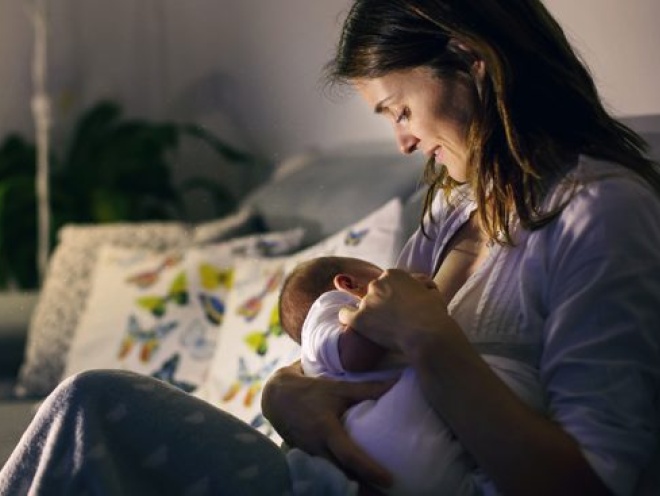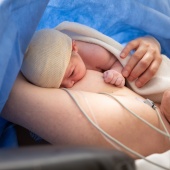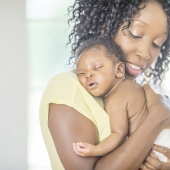New mums often want to know if they can drink when they’re breastfeeding, especially if they have avoided alcohol during pregnancy. We look at the facts.
So can I drink alcohol when I’m breastfeeding?
Alcohol consumed occasionally in low or moderate amounts is unlikely to harm your baby (NHS, 2019; Wilson et al, 2017) . There is also no evidence that low-level drinking during breastfeeding shortens how long you will breastfeed (Wilson et al, 2017). What's more, there's no information on the effect of long-term daily exposure to alcohol.
When you consume alcohol, it goes into your blood, and then into your breastmilk at around the same level it is in your blood (Mennella, 2018). Alcohol in the mum’s blood would reach 300mg/100ml before the baby is mildly sedated (Hale & Rowe, 2017). For comparison, 80mg/100ml would fail drink/drive limits in England, Wales and Northern Ireland (50mg/100ml in Scotland) (Gov.uk, no date).
NHS guidance states that alcohol consumption for all adults, including breastfeeding women, shouldn’t exceed 14 units spread over a week (NHS, 2019).
One unit of alcohol is 10ml of pure alcohol. So, for example:
- Single 25ml shot of spirit like vodka or gin = 1 unit
- 275ml bottle of alcopop = 1.5 units
- Small 125ml glass of wine = 1.5 units
- 330ml bottle of lager, beer or cider = 1.7 units
- 440ml can of lager, beer or cider = 2 units
- Pint of lower-strength lager, beer or cider = 2 units
- Standard 175ml glass of wine = 2.1 units
- Pint of higher-strength lager, beer or cider = 3 units
- Large 250ml glass of wine = 3 units
(NHS, 2018b)
Remember that 'home' measures might be larger than these, so take that into consideration if you are drinking while breastfeeding.
What are the effects of drinking alcohol while breastfeeding?
The amount of alcohol a baby takes in through breastmilk is very small. If the mum has consumed alcohol in the hour beforehand, it will peak in the baby's bloodstream at the same level around an hour later (Mennella, 2018). The concentration then reduces over the following several hours, though it’s not possible to say exactly how long this takes for each woman (Menella, 2018).
One study suggests that a ‘low level of drinking’ is not linked to a shorter duration of breastfeeding or adverse outcomes in babies up to 12 months (Wilson et al., 2017).
But there is very little research on the effects of such small amounts of alcohol on a growing baby. The available research does suggest that drinking alcohol while breastfeeding might have the following effects:
Effects on your ability to take care of your baby
The most significant thing to consider is that alcohol can make you less aware of what your baby needs, and impair your judgement and reaction time – both of which are important when taking care of a baby (NHS, 2018c). So if you do plan to drink heavily, make sure a sober adult is around to help with looking after your baby (NHS 2019).
Never share a bed, armchair or sofa with your baby if you have had any alcohol, as this has been strongly linked to an increased risk of sudden infant death syndrome (NHS, 2019).
Effects on milk supply
People used to think that moderate beer consumption might help to start off breastfeeding. Mums were actually encouraged to drink alcohol to help them relax and encourage their milk supply (Koletzko and Lehner, 2000).
Research now suggests it’s the barley and hops that might increase a mum’s milk supply rather than the alcohol. That’s because the effect was similar whether it was alcoholic beer or non-alcoholic beer (Lactmed, 2019).
Other research has shown that women who have consumed alcohol produce 20% less milk at the next feed than those who have had a non-alcoholic drink (Mennella, 2018). The babies made up their intake in the following 8-16 hours (Hale & Rowe, 2017) . The quality of the milk was not affected, and babies did not reject the milk, but if you’re concerned about low milk production, you may wish to avoid alcohol while you’re breastfeeding (Mennella, 2018).
Effects on your baby’s sleep
Another myth about having an alcoholic drink while breastfeeding is that it relaxes your baby and helps them to sleep.
Studies have shown that a mum’s alcohol consumption while breastfeeding might negatively affect their child’s sleep. A small study of 12 babies found babies exposed to alcohol though breastmilk might sleep for shorter periods but more often during a day, although their total amount of sleep in the three hours after consuming milk including alcohol was not significantly different to days when the mum didn’t drink (Mennella and Beauchamp, 1991).
Conversely, another study of 13 babies found that they slept less in the 3.5 hours after consuming breastmilk with alcohol when their mothers drank one or two alcoholic drinks than when they didn’t drink (Mennella and Gerrish, 1998).
There is no evidence that alcohol has a positive affect on babies’ sleep. Some research shows babies may be more agitated and mothers less consistent in their responses when they have drunk alcohol. (Schuetze et al, 2002)
When breastfeeding, how long does it take for alcohol to leave the system?
Around 30 to 60 minutes after drinking there will be the highest concentration of alcohol in breastmilk. It’ll take a little longer if you’ve been eating too. The alcohol concentration in your breastmilk declines at the same rate as it does in your blood (Mennella, 2018).
The NHS suggest you avoid breastfeeding for two to three hours per drink after drinking to minimise the concentration of alcohol in breastmilk (NHS, 2019). To avoid any impact on supply, you may want to make sure breastfeeding is well established before you try this. This will usually be when your baby is 6-8 weeks old.
‘Pump and dump’
So-called ‘pumping and dumping’ is when women express or ‘pump’ their breastmilk and discard/’dump’ the milk. Some mums believe that this will ‘get rid’ of the alcohol so they can breastfeed their baby afterwards.
The snag is that breastmilk will have the same alcohol concentration as your blood. So pumping and dumping immediately after drinking alcohol doesn’t speed up the disappearance of alcohol from the milk. The newly produced milk will contain alcohol as long as the mother has measurable blood alcohol levels (Mennella, 2018).
All your body needs is time to metabolise the alcohol so there’s no more left in your blood or breastmilk. The length of time varies by woman, but 2-3 hours for every drink is suggested (NHS, 2019).
If you’re not sure how much you might end up drinking, you could plan ahead by expressing some milk beforehand. You can then skip the first breastfeed after the event and feed your baby with your previously expressed milk instead (NHS, 2019).
There is no need to ‘pump and dump’ milk unless you’re experiencing discomfort from your breasts being too full. If you’re separated from your baby for a few hours, you might wish to express milk (by hand or using a pump) for comfort, but also to prevent blocked ducts or mastitis.
Tips on cutting down on alcohol
If you normally enjoy a drink and want to cut down on alcohol whether or not you are breastfeeding, these ideas may help:
- If you’re going out, make a plan and set a budget to spend on alcohol that you stick to.
- Buy a smaller drink, or choose something that isn’t as strong.
- Quench your thirst with non-alcoholic drinks or mocktails and stay hydrated by drinking water between alcoholic drinks.
- Sip your drink and put it down between sips.
- Ask family and friends to support you by not offering to pour or prepare you drinks.
- Make some of the days of the week alcohol free and don’t drink more than two units on the other days.
(NHS, 2018c)
If you drink a lot and are worried about how to cut down, then talk to your midwife or family doctor. Alternatively, you can call one of the helplines listed below.
This page was last reviewed in March 2021.
Further information
NCT supports all parents, however they feed their baby. Call our infant feeding support line on 0300 330 0700 to speak to a breastfeeding counsellor if you have questions, concerns or need support, whether you are exclusively breastfeeding or using formula milk. Breastfeeding counsellors have had extensive training, will listen without judging or criticising and will offer relevant information and suggestions. You can also find more useful articles here.
You might find attending one of our NCT New Baby courses helpful as they give you the opportunity to explore different approaches to important parenting issues with a qualified group leader and other new parents in your area.
Make friends with other parents-to-be and new parents in your local area for support and friendship by seeing what NCT activities are happening nearby.
Alcoholics Anonymous (AA) is concerned with the personal recovery and continued sobriety of individual alcoholics who ask for help. National Helpline number 0800 917 7650.
Al-Anon Family Groups are there for anyone whose life is or has been affected by someone else's drinking. Call 0800 0086 811.
With You is a UK-wide treatment agency that delivers support and raises awareness around drugs, alcohol and mental health.
Adfam empowers family members and carers to prevent drug and alcohol abuse threatening family relationships and wellbeing.
Gov.uk (no date) The drink drive limit, Available at: https://www.gov.uk/drink-drive-limit \
Haastrup MB, Pottegård A, Damkier P. (2014) Alcohol and breastfeeding. Basic & Clinical Pharmacology & Toxicology. 114(2):168-173. Available at: https://onlinelibrary.wiley.com/doi/10.1111/bcpt.12149
Hale TW & Rowe HE (2017) Medications and mother’s milk. New York, Springer
Koletzko B, Lehner F. (2000) Beer and breastfeeding. Adv Exp Med Biol. 478:23-28. Available at: https://pubmed.ncbi.nlm.nih.gov/11065057/
Lactmed. (2019) Alcohol. Available at: https://www.ncbi.nlm.nih.gov/books/NBK501469/
Low level drinking during breastfeeding is not linked with shorter breastfeeding duration or adverse outcomes in infants up to 12 months of age. (Wilson et al, 2017 https://onlinelibrary.wiley.com/doi/abs/10.1111/dar.12473 )
Mennella JA, Beauchamp GK. (1991) The transfer of alcohol to human milk: effects on flavor and the infant's behavior. New England Journal of Medicine. 325:981-985. Available at: https://www.nejm.org/doi/10.1056/NEJM199110033251401?url_ver=Z39.88-2003%C2%A0%5B
Mennella JA, Gerrish CJ. (1998) Effects of exposure to alcohol in mother’s milk on infant sleep. Pediatrics. 101:e2-e2. Available at: https://pubmed.ncbi.nlm.nih.gov/9565435/
Mennella JA. (1998) Short-term effects of maternal alcohol consumption on lactational performance. Alcoholism: Clinical and Experimental Research. 22(7):1389-1392. Available at: https://www.ncbi.nlm.nih.gov/pubmed/9802517 [Accessed 1st June 2018]
Mennella JA. (2018) Alcohol’s effect on lactation. Available at: https://pubs.niaaa.nih.gov/publications/arh25-3/230-234.htm [Accessed 1st June 2018]
NHS. (2019) Breastfeeding and drinking alcohol. Available at: https://www.nhs.uk/conditions/pregnancy-and-baby/breastfeeding-alcohol/
NHS. (2018b) Alcohol units. Available at: https://www.nhs.uk/live-well/alcohol-support/calculating-alcohol-units/ [Accessed 1st June 2018]
NHS. (2018c) Tips on cutting down. Available at: https://www.nhs.uk/live-well/alcohol-support/tips-on-cutting-down-alcohol/ [Accessed 1st March 2018]
NICE (2021) Postnatal care [NG194]. Available at: https://www.nice.org.uk/guidance/ng194/chapter/recommendations#bed-sharing [Accessed 11 Jan 21]
RCOG. (2018) Alcohol and pregnancy. Available at: https://www.rcog.org.uk/globalassets/documents/patients/patient-informa… [Accessed 1st June 2018]
Schuetze P, Das Eiden R, Chan AW. The effects of alcohol in breast milk on infant behavioral state and mother-infant feeding interactions. Infancy. 2002;3:349–63. https://pubmed.ncbi.nlm.nih.gov/33451218/
Wilson et al (2017) Alcohol consumption by breastfeeding mothers: Frequency, correlates and infant outcomes. Available at: https://doi.org/10.1111/dar.12473
Links all accessed/checked/updated 17th March 2021.






